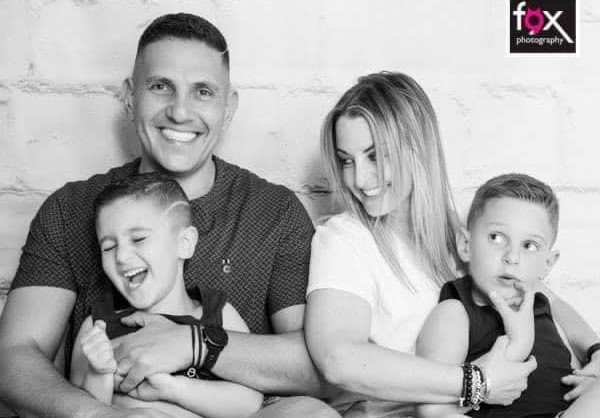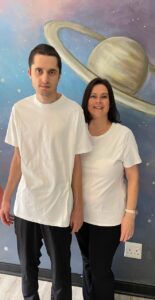
Featured Item

Hard road to parent children with autism
Parents of children diagnosed with autism often walk a lonely road. As we mark Autism Awareness Month, we chat to two mothers about the often-devastating condition.
“You’re dealing with a child who needs constant attention and care. There’s absolutely no reprieve. You’re exhausted, you’re sad. Yet, kindness from family, friends, and even strangers goes a long way to alleviating the pressures of an extraordinarily hard life,” says Jacqui Miller, whose firstborn son Jude, now 11, has autism spectrum disorder (ASD), a group of developmental disabilities that can cause a wide array of significant social, communication, and behavioural challenges.
These are defined in terms of the Diagnostic and Statistical Manual of Mental Disorders, or DSM-5. “They look at language, social, and repetitive behaviour, and make an autism diagnosis,” says Ilana Gerschlowitz, the author of Saving my Sons: A Journey with Autism, and the director of the Star Academy, which provides programmes for children on the autism spectrum as well as those with ADHD (Attention Deficit Hyperactivity Disorder) or any developmental delay.
Gerschlowitz argues that with the absorption of Asperger’s syndrome into the definition of ASD, the spectrum of autism has become too broad. “You can have a high functioning individual who can go to school, hold down a job, and get married on the one end, and then on the other, you have a completely non-vocal individual, somebody now labelled with what we call ‘profound autism’.”
For example, Jude is classified as having apraxia of speech, a neurological disorder that affects the brain pathways involved in producing speech. “Jude communicates through pictures and sounds on his iPad and with gestures such as pointing to or taking us to what he needs,” says Miller. She recently wrote a book called Hey Jude, a cathartic experience that helped her to promote kindness in the face of struggle.
“Not being able to have a conversation with Jude is tremendously difficult, and breaks our hearts every day,” says Miller, “but you develop a relationship based on true and pure love. When Jude is feeling sad, he tells us by hugging us deeply. We have to learn daily to try and understand his every emotion. This, in a way, has brought us to a closeness that’s so unique and strong, it’s almost indescribable.” Yet this journey was the hardest thing she has had to endure, she says, which is why community support is so important.
While initially neurotypical, Jude withdrew into himself at about 22 months. “He had reached all of his milestones and in fact was ahead of some of his kids in his play groups,” Miller recalls. “Then, he contracted a virus called Kawasaki disease, and this either brought on his limitations or he was predisposed to ASD, and the virus brought it out.”
Indeed, says Gerschlowitz, children who develop autism have vulnerable genetics. “When their genetics come into contact with environmental triggers including certain food, water, air, infection, and toxins, those things act as a match that lights a pile of wood that makes a fire. Autism is the fire.”

With dramatically rising rates of diagnosis, attributed to an increasingly toxic environment, finding the right treatment is more vital than ever, says Gerschlowitz. “At the Star Academy, we use a teaching method called applied behaviour analysis [ABA], the only evidence-based treatment for children with autism. It identifies missing developmental skills and focuses on designing lesson programmes to teach acquisition of these skills and reduce challenging behaviours.”
Though Gerschlowitz says it’s never too late to start the right treatment, early intervention sets the stage for the best outcome. In some cases, it brings about recovery, where a child is indistinguishable from his peers and is in mainstream schooling.
“Some children may be high functioning and with the right intervention, could land up at a mainstream school and be successful. With others who are more affected, we work towards their independence and functionality.” Gerschlowitz herself has experienced these diverse outcomes with two of her three sons.
“My oldest son, David, is 21 years old, and he’s profoundly autistic,” she says. “He has the kind of autism not portrayed in series or movies. The worst kind of autism, the kind that takes your breath away and changes you forever. For us and many other parents, this is our reality. Not, the ‘my child is a gift’ autism they love to talk about, or ‘my child who sees the world differently’ kind of autism we apparently must ‘accept’. I don’t accept anything. And I certainly don’t celebrate autism.”
“My heart breaks for all the families who suffer because autism stole from us – our children’s health, their voice, and their functionality. The cricket matches and soccer tournaments and playdates and school uniforms.” According to a research paper published in America, parents raising children on the spectrum have higher anxiety levels than a combat veteran, she says.
That’s why Gerschlowitz started the Star Academy, initially born of research into tackling David’s condition. Though David hasn’t recovered, ABA improved his functionality, empowering him to communicate his basic needs on an iPad and gain quality of life by working in a kitchen that helps to feed the homeless.
Her youngest son, now 11 and treated with a customised ABA programme early on, has been rediagnosed as no longer having autism. “He’s a miracle,” she says. “When he was two or three years old, we were fighting for speech, for functionality, for language. We got our boy back, and I’m so grateful to Hashem.”
Gerschlowitz urges parents facing such a diagnosis to “keep finding ways to keep their hope alive”. If your child isn’t responding well to a treatment or therapist, find another one, she says. If they’re battling at school, move them.
In her book, Miller says she and her husband will never give up hope. “There are days where I feel I could just run away, but that will never happen. We’ll continue to fight this fight. Our gloves are on.”





Amy
April 6, 2024 at 12:00 am
This is such an inappropriate article. It also contains rhetoric and language that is profoundly outdated. Autism isn’t a disease or something to be scared of; the autistic community (many of whom are parents) work hard to fight stigma. It’s Autism Acceptance Month, and this article shows we are moving backward instead of forward. I would love to see a revised article or an apology, vetted by an actually autistic adult.